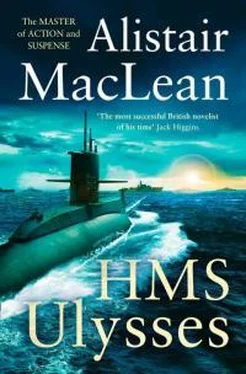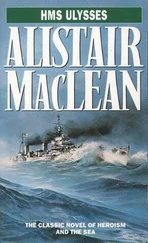The Stirling would have died anyway – but the Stukas made siccar. The Northern Lights had long since gone: now, too, the clear skies were going, and dark cloud was banking heavily to the north. Men hoped and prayed that the cloud would spread over FR77, and cover it with blanketing snow. But the Stukas got there first.
The Stukas – the dreaded gull-winged Junkers 87 dive-bombers – came from the south, flew high over the convoy, turned, flew south again. Level with, and due west of the Ulysses , rear ship in the convoy, they started to turn once more: then, abruptly, in the classic Stuka attack pattern, they peeled off in sequence, port wings dipping sharply as they half-rolled, turned and fell out of the sky, plummeting arrow-true for their targets. Any plane that hurtles down in undeviating dive on waiting gun emplacements has never a chance. Thus spoke the pundits, the instructors in the gunnery school of Whale Island, and proceeded to prove to their own satisfaction the evident truth of their statement, using AA guns and duplicating the situation which would arise insofar as it lay within their power. Unfortunately, they couldn’t duplicate the Stuka.
‘Unfortunately’, because in actual battle, the Stuka was the only factor in the situation that really mattered. One had only to crouch behind a gun, to listen to the ear-piercing, screaming whistle of the Stuka in its near-vertical dive, to flinch from its hail of bullets as it loomed larger and larger in the sights, to know that nothing could now arrest the flight of that underslung bomb, to appreciate the truth of that. Hundreds of men alive today – the lucky ones who endured and survived a Stuka attack – will readily confirm that the war produced nothing quite so nerve-rending, quite so demoralizing as the sight and sound of those Junkers with the strange dihedral of the wings in the last seconds before they pulled out of their dive.
But one time in a hundred, maybe one time in a thousand, when the human factor of the man behind the gun ceased to operate, the pundits could be right. This was the thousandth time, for fear was a phantom that had vanished in the night: ranged against the dive-bombers were only one multiple pom-pom and half a dozen Oerlikons – the for’ard turrets could not be brought to bear – but these were enough, and more, in the hands of men inhumanly calm, ice-cool as the Polar wind itself, and filled with an almost dreadful singleness of purpose. Three Stukas in almost as many seconds were clawed out of the sky, two to crash harmlessly in the sea, a third to bury itself with tremendous impact in the already shattered day cabin of the Admiral.
The chances against the petrol tanks not erupting in searing flame or of the bomb not exploding were so remote as not to exist: but neither happened. It hardly seemed to call for comment – in extremity, courage becomes routine – when the bearded Doyle abandoned his pom-pom, scrambled up to the fo’c’sle deck, and flung himself on top of the armed bomb rolling heavily in scuppers awash with 100 per cent octane petrol. One tiny spark from Doyle’s boot or from the twisted, broken steel of the Stuka rubbing and grinding against the superstructure would have been trigger enough: the contact fuse in the bomb was still undamaged, and as it slipped and skidded over the ice-bound deck, with Doyle hanging desperately on, it seemed animistically determined to smash its delicate percussion nose against a bulkhead or stanchion.
If Doyle thought of these things, he did not care. Coolly, almost carelessly, he kicked off the only retaining clip left on a broken section of the guard-rail, slid the bomb, fins first, over the edge, tipped the nose sharply to clear the detonator. The bomb fell harmlessly into the sea.
It fell into the sea just as the first bomb sliced contemptuously through the useless one-inch deck armour of the Stirling and crashed into the engineroom. Three, four, five, six other bombs buried themselves in the dying heart of the cruiser, the lightened Stukas lifting away sharply to port and starboard. From the bridge of the Ulysses , there seemed to be a weird, unearthly absence of noise as the bombs went home. They just vanished into the smoke and flame, engulfed by the inferno.
No one blow finished the Stirling , but a mounting accumulation of blows. She had taken too much and she could take no more. She was like a reeling boxer, a boxer overmatched against an unskilled but murderous opponent, sinking under an avalanche of blows.
Stony-faced, bitter beyond words at his powerlessness, Turner watched her die. Funny, he thought tiredly, she’s like all the rest. Cruisers, he mused in a queerly detached abstraction, must be the toughest ships in the world. He’d seen many go, but none easily, cleanly, spectacularly. No sudden knock-out, no coup de grâce for them – always, always, they had to be battered to death . . . Like the Stirling . Turner’s grip on the shattered windscreen tightened till his forearms ached. To him, to all good sailors, a well-loved ship was a well-loved friend: for fifteen months, now, the old and valiant Stirling had been their faithful shadow, had shared the burden of the Ulysses in the worst convoys of the war: she was the last of the old guard, for only the Ulysses had been longer on the blackout run. It was not good to watch a friend die: Turner looked away, stared down at the ice-covered duckboards between his feet, his head sunk between hunched shoulders.
He could close his eyes, but he could not close his ears. He winced, hearing the monstrous, roaring hiss of boiling water and steam as the white-hot superstructure of the Stirling plunged deeply into the ice-chilled Arctic. For fiteen, twenty seconds that dreadful, agonized sibilation continued, then stopped in an instant, the sound sheared off as by a guillotine. When Turner looked up, slowly, there was only the rolling, empty sea ahead, the big oil-slicked bubbles rising to the top, bubbles rising only to be punctured as they broke the surface by the fine rain falling back into the sea from the great clouds of steam already condensing in that bitter cold.
The Stirling was gone, and the battered remnants of FR77 pitched and plunged steadily onwards to the north. There were seven ships left now – four merchantmen, including the Commodore’s ship, the tanker, the Sirrus and the Ulysses . None of them was whole: all were damaged, heavily damaged, but none so desperately hurt as the Ulysses . Seven ships, only seven: thirty-six had set out for Russia.
At 0800 Turner signalled the Sirrus : ‘WT gone. Signal C-in-C course, speed, position. Confirm 0930 as rendezvous. Code.’
The reply came exactly an hour later. ‘Delayed heavy seas. Rendezvous approx 1030. Impossible fly off air cover. Keep coming. C-in-C.’
‘Keep coming!’ Turner repeated savagely. ‘Would you listen to him! “Keep coming,” he says! What the hell does he expect us to do – scuttle ourselves?’ He shook his head too in angry despair. ‘I hate to repeat myself,’ he said bitterly. ‘But I must. Too bloody late as usual!’ [7] It is regrettable but true – the Home Fleet squadron was almost always too late. The Admiralty could not be blamed – the capital ships were essential for the blockade of the Tirpitz ; and they did not dare risk them close inshore against the land-based bombers. The long awaited trap did eventually snap shut; but it caught only the heavy cruiser Scharnhorst and not the Tirpitz . It never caught the great ship. She was destroyed at her anchorage in Alta Fjord by Lancaster bombers of the Royal Air Force.
Dawn and daylight had long since come, but it was growing darker again. Heavy grey clouds, formless and menacing, blotted out the sky from horizon to horizon. They were snow clouds, and, please God, the snow would soon fall: that could save them now, that and that alone. But the snow did not come – not then. Once more, there came instead the Stukas, the roar of their engines rising and falling as they methodically quartered the empty sea in search of the convoy – Charlie had left at dawn. But it was only a matter of time before the dive-bomber squadron found the tiny convoy; ten minutes from the time of the first warning of their approach, the leading Junkers 87 tipped over its wing and dropped out of the sky.
Читать дальше
Конец ознакомительного отрывка
Купить книгу










